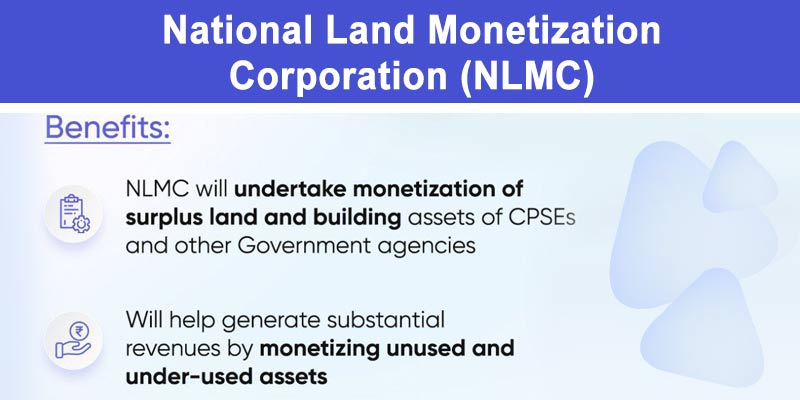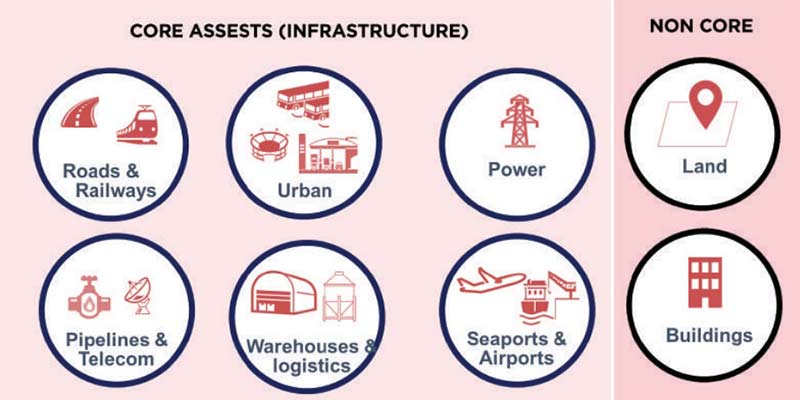- India
- Mar 10
What is National Land Monetisation Corporation (NLMC)?
• The Union Cabinet approved creating a new company to hold and monetise surplus land and buildings of government agencies and PSUs that are being privatised or being shut down.
• The special purpose vehicle (SPV) called the National Land Monetisation Corporation (NLMC) will be set up as a wholly-owned government of India company with an initial authorised share capital of Rs 5,000 crore and paid-up share capital of Rs 150 crore.
• NLMC will undertake monetisation of surplus land and building assets of Central Public Sector Enterprises (CPSEs) and other government agencies.
• With monetisation of non-core assets, the government would be able to generate substantial revenues by monetising unused and under-used assets.
Asset monetisation
• Asset monetisation, also commonly referred to as asset or capital recycling, is globally a widely used business practice. This consists of limited period transfer of performing assets (or disposing of non-strategic / underperforming assets) to unlock “idle” capital and reinvesting it in other assets or projects that deliver improved or additional benefits.
• Asset monetisation is based on the philosophy of “creation through monetisation”.
• Asset recycling and monetisation is the key to value creation in infrastructure by serving two critical objectives, unlocking value from public investment in Infrastructure and tapping private sector efficiencies in operations and management of infrastructure.
National Monetisation Pipeline
• The National Infrastructure Pipeline (NIP) envisaged a projected infrastructure investment of Rs 111 lakh crore during FY 2020 to FY 2025. The NIP task force report has estimated that about 15-17 per cent of this outlay is to be met through innovative and alternative initiatives such as asset monetisation, funding through a new Development Finance Institution (DFI), etc.
• Based on the mandate for asset monetisation, the National Monetisation Pipeline (NMP) has been developed by NITI Aayog in consultation with infrastructure line ministries. It is envisaged to serve as an essential roadmap for the asset monetisation of various brownfield infrastructure assets across roads, railways, shipping, aviation, power, telecom, oil & gas, and warehousing sectors.
• The NMP will also form a baseline for the asset owning ministries for monitoring and tracking performance of the potential assets.
• The NMP estimates aggregate monetisation potential of Rs 6 lakh crore through core assets of the central government, over a four-year period, from FY 2022 to FY 2025.
• The top five sectors which capture around 83 per cent of the aggregate pipeline value include: roads (27 per cent) followed by railways (25 per cent), power (15 per cent), oil & gas pipelines (8 per cent) and telecom (6 per cent).
• Infrastructure includes asset classes such as transport (roads, rail, ports, airports), power generation, transmission networks, pipelines, warehouses etc. The other assets, which generally include land parcels and buildings, can be categorised as non-core assets.
• Monetisation of non-core assets envisages unlocking of value of unutilised or under-utilised assets and generate returns on the equity that the government has invested in them. So far, CPSEs have referred 3,400 acres of land and other non-core assets to the Department of Investment and Public Asset Management (DIPAM) for monetisation.
• At present, the desired skill set to take on the responsibility of management and monetisation of non-core assets in government is limited.
• In the Union Budget 2021-22, Finance Minister Nirmala Sitharaman announced setting up of a Special Purpose Vehicle (SPV), with capacity and expertise, to carry out the monetisation of the land and other non-core assets in an efficient and prudent manner, in line with international best practices.
• In pursuance of the Budget announcement, ‘National Land Monetisation Corporation’ (NLMC) is being incorporated.
National Land Monetisation Corporation (NLMC)
• At present, CPSEs hold considerable surplus, unused and underused non-core assets in the nature of land and buildings. For CPSEs undergoing strategic disinvestment or closure, monetisation of these surplus land and non-core assets is important to unlock their value.
• NLMC will support and undertake monetisation of these assets.
• This will also enable productive utilisation of these under-utilised assets to trigger private sector investments, new economic activities, boost the local economy and generate financial resources for economic and social infrastructure.
• NLMC is expected to own, hold, manage and monetise surplus land and building assets of CPSEs under closure and the surplus non-core land assets of government-owned CPSEs under strategic disinvestment.
• This will speed up the closure process of CPSEs and smoothen the strategic disinvestment process of government-owned CPSEs. These assets may be transferred to NLMC to hold, manage and monetise these assets.
• NLMC will also advise and support other government entities (including CPSEs) in identifying their surplus non-core assets and monetising them in a professional and efficient manner to generate maximum value realisation.
• It is expected that NLMC will act as a repository of best practices in land monetisation, assist and provide technical advice to the government in the implementation of the asset monetisation programme.
Management of NLMC
• NLMC will have necessary technical expertise to professionally manage and monetise land assets on behalf of CPSEs and other government agencies.
• It will be set up under the administrative jurisdiction of the finance ministry, will be a lean organisation with minimal full-time staff, hired directly from the market on a contract basis.
• The Board of Directors of NLMC will comprise senior central government officers and eminent experts to enable professional operations and management of the company.
• The chairman, non-government directors of the NLMC will be appointed through a merit-based selection process.
• Flexibility will be provided to the Board of NLMC to hire, pay and retain experienced professionals from the private sector.
• This was considering that real estate monetisation requires specialised skills and expertise in areas such as market research, legal due diligence, valuation, master planning, investment banking and land management.
• NLMC will hire professionals from the private sector just as in the case of similar specialised government companies like the National Investment and Infrastructure Fund (NIIF) and Invest India.
Manorama Yearbook app is now available on Google Play Store and iOS App Store


